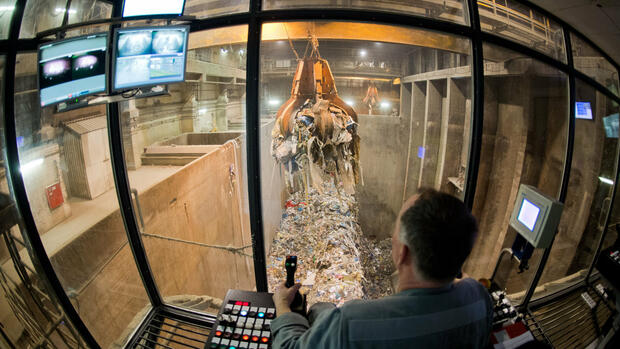It is said that unavoidable waste must continue to be incinerated in the future.
(Photo: dpa)
Berlin The draft of the Building Energy Act (GEG) provides for waste heat from waste incineration plants to be classified as “renewable”. Mathematically, this can help to make progress on the way to a climate-neutral heat supply. But from the point of view of environmental protection and sustainability, according to conservationists and the recycling industry, it is “a catastrophe”.
The GEG draft, which Economics Minister Robert Habeck (Greens) and Building Minister Klara Geywitz (SPD) brought through the cabinet in April, stipulates that from 2024 every newly installed heating system should be operated with 65 percent renewable energies.
Heating networks are also to gradually become greener in the coming years. By 2030, they should have at least 50 percent heat from renewable energies or waste heat, and by 2045 they must be completely greenhouse gas neutral.
According to their own statements, the companies grouped together in the interest group for thermal waste treatment (ITAD) operate 59 waste incineration plants with heat extraction, which supply 2.02 million households with heat. Many of these facilities are owned by local authorities.
“Encouraging more waste incineration”
With the planned definition of waste heat from waste incineration, there is a fulfillment option to increase the proportion of renewables in a heating network. The draft law classifies heat generated from waste incineration as “unavoidable” and 100 percent renewable.
About two thirds of the contents of the average residual waste bin in Germany are waste that can be recycled.
(Photo: IMAGO/photo2000)
From the point of view of Eric Schweitzer, owner of the disposal company ALBA, this is incomprehensible and counterproductive. “Cities and counties will see this law as a stimulus and encouragement for more incineration,” he said. “Instead of rewarding waste separation and resource conservation, Habeck is now promoting increased incineration and the waste of raw materials. What is supposed to be ‘renewable’ or ‘unavoidable’ about it remains unexplained,” criticized Schweitzer.
>> Read here: All current developments in the energy crisis in the news blog
Michael Jedelhauser, an expert in circular economy at the German Nature Conservation Union (NABU), agrees with Schweitzer. The definition in the draft law is based on the misconception that incineration is an unavoidable waste disposal practice. “The opposite is the case: around two-thirds of the content of the average residual waste bin in Germany is recyclable waste, especially organic waste, but also waste paper, packaging waste or old electrical equipment.”
Materially recyclable means that waste does not have to be incinerated but can also be reused, such as paper and glass. “There are well-developed separate collection systems for this waste in Germany, which is why waste incineration with its significant fossil and biogenic CO2 emissions is by no means unavoidable,” says Jedelhauser.
Traffic light politicians defend the plan
Schweitzer said the first thing to do is avoid waste. If waste is nevertheless produced, it must be recycled as far as possible. If residual waste is no longer suitable for recycling, it can still be used to produce high-quality alternative fuels. “And only when even this is no longer possible is the waste incineration plant the last resort,” said Schweitzer.
Not all waste needs to be incinerated. Materials such as paper or glass could also be reused.
(Photo: dpa)
Jederlhauser considers the planned regulation to be “contradictory and incomprehensible”. He calls for the GEG to regulate that waste incineration should not be classified as unavoidable waste heat and that it should therefore not be fully counted towards meeting the requirements for heat supply.
“Otherwise, the absurd situation will arise in which municipalities operate climate-neutral heating networks on paper, but in reality continue to emit avoidable CO2 through their waste incineration plants,” he warns.
Politicians of the traffic light coalition, on the other hand, defend the plans, such as the SPD member of the Bundestag Markus Hümpfer: “The classification is justified. Waste-to-energy plants supply thousands of households with heat anyway and thus make a major contribution to decarbonization in the heating sector,” said Hümpfer.
Unavoidable waste will also have to be incinerated in the future. The separation and storage or recycling of the released CO2 will be a solution in the future.
>> Read also: Heat plans should cover every house
However, Hümpfer admitted that the recycling rate must be significantly improved. “We have to see waste even more as a raw material and anchor it even more firmly in people’s minds,” he said.
The municipal utilities, which operate many of the waste incineration plants, also welcome the option planned by the traffic light coalition to meet the renewable share in heating networks. They point out that waste incineration is also done for hygienic reasons.
The use of waste heat is “sensible and correct in order to make the environmental balance of waste incineration as sustainable as possible,” said a spokeswoman for the Association of Municipal Companies (VKU), in which the municipal utilities are combined. The resulting fossil CO2 emissions are to be attributed to the products in a life cycle assessment, not to the waste disposal as such.
More: Plumbers refuse orders to install gas boilers
